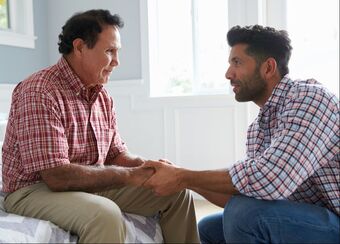My loved one was recently diagnosed with dementia. How can I help them in the early stages?1/21/2023 By: Nicole Ruggiano, PhD, MSW It is never easy for someone to receive a diagnosis of Alzheimer's disease or other type of dementia. In fact, research has shown that older adults are more afraid about dementia than they are afraid of cancer. It is normal for those who are diagnosed with dementia to experience a number of emotions, including fear about the future, anger, depression and denial. If your loved one has recently been diagnosed with a form of dementia and is having a hard time coping with their diagnosis, there are things that family and friends can do to help them in these early stages of their condition.
9 Comments
By, Nicole Ruggiano, PhD, MSW Some time ago, I met a caregiver in Jefferson County named Mary who asked: How do I get my husband to stop giving out our banking information? Sometimes I catch him on the phone talking about our finances and I have no idea who he is talking to or how much information he gave out and it scares me. Oftentimes, one of the earliest signs that a loved one is developing dementia is when their difficulty in managing their finances becomes noticeable to others. For example, a person with dementia may be overspending to the point of financial instability. A person with dementia who is unable to manage the task of paying bills could have utilities cut off or large financial fees for late or missing payments. In other cases, like the one Mary was experiencing, a person with dementia may be at increased risk for financial exploitation or identity theft. As a result, many caregivers end up taking on the day-to-day finances for their loved one. Whether you are already managing you're loved one's finances or beginning to suspect that this task may be placed on you in the future, there are some things you should consider. By, Nicole Ruggiano, PhD, MSW When caregivers tell me how much their loved one's dementia symptoms upset them, they are most upset when their spouse or parent does not recognize them anymore. I understand this first hand. When my grandmother's dementia became severe, she would become scared and upset when I visited her. She didn't know who I was anymore. To her, I was a stranger who entered her home uninvited. There was nothing I could say to make her understand that I was her granddaughter. I even pointed to photographs of me that were hanging in her apartment to show that she did, in fact, know me. However, this didn't help and she remained agitated and scared. While this was an emotional process for me, it is a common symptom for people with dementia and is a result of the changes to the brain caused by Alzheimer's disease or other type of dementia. |
Caregiving 101The Caregiving 101 is a resource for caregivers in Alabama who want to learn more about caregiving and dementia. Archives
August 2023
What would you like to learn more about?
All
|
205-348-4654

 RSS Feed
RSS Feed
